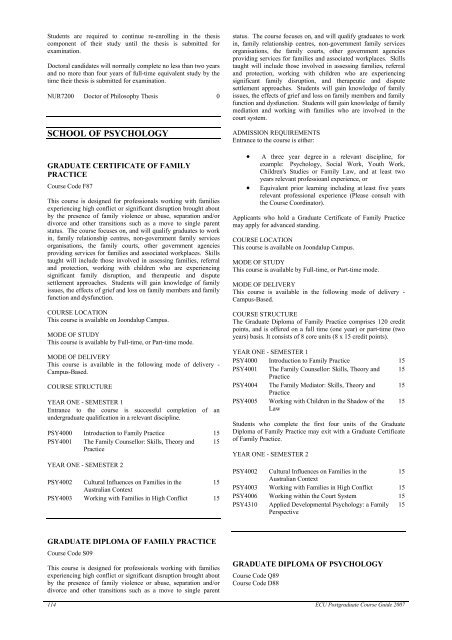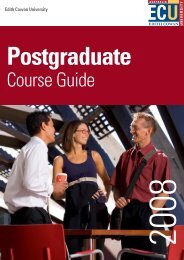Course Guide - Edith Cowan University
Course Guide - Edith Cowan University
Course Guide - Edith Cowan University
Create successful ePaper yourself
Turn your PDF publications into a flip-book with our unique Google optimized e-Paper software.
Students are required to continue re-enrolling in the thesis<br />
component of their study until the thesis is submitted for<br />
examination.<br />
Doctoral candidates will normally complete no less than two years<br />
and no more than four years of full-time equivalent study by the<br />
time their thesis is submitted for examination.<br />
NUR7200 Doctor of Philosophy Thesis 0<br />
SCHOOL OF PSYCHOLOGY<br />
GRADUATE CERTIFICATE OF FAMILY<br />
PRACTICE<br />
<strong>Course</strong> Code F87<br />
This course is designed for professionals working with families<br />
experiencing high conflict or significant disruption brought about<br />
by the presence of family violence or abuse, separation and/or<br />
divorce and other transitions such as a move to single parent<br />
status. The course focuses on, and will qualify graduates to work<br />
in, family relationship centres, non-government family services<br />
organisations, the family courts, other government agencies<br />
providing services for families and associated workplaces. Skills<br />
taught will include those involved in assessing families, referral<br />
and protection, working with children who are experiencing<br />
significant family disruption, and therapeutic and dispute<br />
settlement approaches. Students will gain knowledge of family<br />
issues, the effects of grief and loss on family members and family<br />
function and dysfunction.<br />
COURSE LOCATION<br />
This course is available on Joondalup Campus.<br />
MODE OF STUDY<br />
This course is available by Full-time, or Part-time mode.<br />
MODE OF DELIVERY<br />
This course is available in the following mode of delivery -<br />
Campus-Based.<br />
COURSE STRUCTURE<br />
YEAR ONE - SEMESTER 1<br />
Entrance to the course is successful completion of an<br />
undergraduate qualification in a relevant discipline.<br />
PSY4000 Introduction to Family Practice 15<br />
PSY4001 The Family Counsellor: Skills, Theory and 15<br />
Practice<br />
YEAR ONE - SEMESTER 2<br />
PSY4002 Cultural Influences on Families in the 15<br />
Australian Context<br />
PSY4003 Working with Families in High Conflict 15<br />
status. The course focuses on, and will qualify graduates to work<br />
in, family relationship centres, non-government family services<br />
organisations, the family courts, other government agencies<br />
providing services for families and associated workplaces. Skills<br />
taught will include those involved in assessing families, referral<br />
and protection, working with children who are experiencing<br />
significant family disruption, and therapeutic and dispute<br />
settlement approaches. Students will gain knowledge of family<br />
issues, the effects of grief and loss on family members and family<br />
function and dysfunction. Students will gain knowledge of family<br />
mediation and working with families who are involved in the<br />
court system.<br />
ADMISSION REQUIREMENTS<br />
Entrance to the course is either:<br />
• A three year degree in a relevant discipline, for<br />
example: Psychology, Social Work, Youth Work,<br />
Children's Studies or Family Law, and at least two<br />
years relevant professioanl experience, or<br />
• Equivalent prior learning including at least five years<br />
relevant professional experience (Please consult with<br />
the <strong>Course</strong> Coordinator).<br />
Applicants who hold a Graduate Certificate of Family Practice<br />
may apply for advanced standing.<br />
COURSE LOCATION<br />
This course is available on Joondalup Campus.<br />
MODE OF STUDY<br />
This course is available by Full-time, or Part-time mode.<br />
MODE OF DELIVERY<br />
This course is available in the following mode of delivery -<br />
Campus-Based.<br />
COURSE STRUCTURE<br />
The Graduate Diploma of Family Practice comprises 120 credit<br />
points, and is offered on a full time (one year) or part-time (two<br />
years) basis. It consists of 8 core units (8 x 15 credit points).<br />
YEAR ONE - SEMESTER 1<br />
PSY4000 Introduction to Family Practice 15<br />
PSY4001 The Family Counsellor: Skills, Theory and 15<br />
Practice<br />
PSY4004 The Family Mediator: Skills, Theory and 15<br />
Practice<br />
PSY4005 Working with Children in the Shadow of the<br />
Law<br />
15<br />
Students who complete the first four units of the Graduate<br />
Diploma of Family Practice may exit with a Graduate Certificate<br />
of Family Practice.<br />
YEAR ONE - SEMESTER 2<br />
PSY4002 Cultural Influences on Families in the 15<br />
Australian Context<br />
PSY4003 Working with Families in High Conflict 15<br />
PSY4006 Working within the Court System 15<br />
PSY4310 Applied Developmental Psychology: a Family<br />
Perspective<br />
15<br />
GRADUATE DIPLOMA OF FAMILY PRACTICE<br />
<strong>Course</strong> Code S09<br />
This course is designed for professionals working with families<br />
experiencing high conflict or significant disruption brought about<br />
by the presence of family violence or abuse, separation and/or<br />
divorce and other transitions such as a move to single parent<br />
GRADUATE DIPLOMA OF PSYCHOLOGY<br />
<strong>Course</strong> Code Q89<br />
<strong>Course</strong> Code D88<br />
114 ECU Postgraduate <strong>Course</strong> <strong>Guide</strong> 2007



